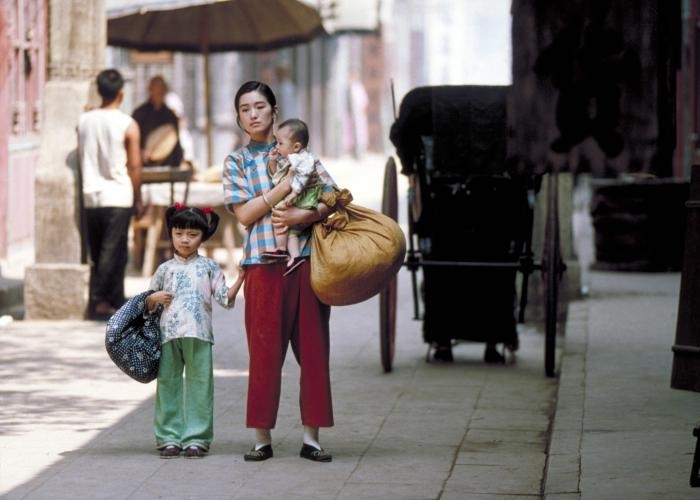Many foreign films were overlooked in 1994 because it was such a strong year for American cinema. In addition, there were limited distribution channels and video stores couldn't get copies in a timely manner. China has always lagged behind Japan and even South Korea in terms of filmmaking, but it had a presence in the early 90's with Farewell, My Concubine and Raise the Red Lantern, A movie like To Live with its fairly simple narrative structure and uncomplicated characters could easily slip through. Oh, and the Chinese government hated the film's anti-Communist message. Not easy challenges to overcome.
Eventually Netflix came along and catching up on missed titles became much easier. This quiet story of an apolitical family surviving several decades of Communist rule got the audience it deserved. It starts by showing the father Fugui as a degenerate gambler. He is losing consistently in a dice game against another man and is careless about tracking his losses. His pregnant wife Jiazhen appears at the den to get him to leave, which only embarrasses him. Soon he has lost his ancestral house, displacing not just his family but his parents (his father calls him "turtle spawn") and Jiazhen returns to her family with their young daughter. The father dies soon after and Fugui is left to seel his remaining possession to survive. After Jiazhen cools off, she returns with a newborn son. She lets him know that things will not be the same and for once, the family unit seems secure.
Fugui borrows a set of metal puppets and hits the road as a showman with his friend Chunseng. Soon they are conscripted into combat by the Chinese Nationalist Army, who is already losing badly to the Mao Tse-tung's Communists in the civil war. One cold night they get drunk and oversleep, realizing that there is no one left on their side. At first they suspect everyone ran off, but the grim reality sets in when they see the results of the carnage. The two men quickly realize they will need to work with the Communists if they are ever going to get home. They perform puppet shows for the winning side and eventually Fugui returns to his family. Their daughter Fengxia is now mute from a fever that she barely survived. Jiazhen has stable work delivering water. The Communists are now in charge, but the couple doesn't seem to care either way. They are uninterested in politics. They only want a safe environment to raise their children.
Soon after he returns, the man who won his house is shot for being a counter-revolutionary. The family takes great lengths to show their support of the working class, even using Fugui's time as an entertainer to their advantage. In the next decade, Communism begins to take hold of the family's everyday life - dictating where they should work (Jiazhen delivers water), where they should eat (communal kitchens), and how they should treat their neighbors (always with suspicion). The grueling work schedules often lead to people (and even children) not sleeping, which leads to the tragic events that lead to their son's death. It's really sad since there were no crimes committed, but it all seemed so pointless. Why couldn't they just let the boy rest?
Time passes and characters drift in and out of the picture. Fengxia is now an adult and finding her a suitable companion becomes high priority. She is soon matched with a Chinese soldier with a lame leg, a good man who may not be as indoctrinated with socialism as he seems. Their union is a happy one, although the daughter is understandably shaken. Her family was her whole world. Also, a character returns to repay his debt. He has been treated coldly by the family (understandably), but now he wants to settle all accounts before he is arrested by the government for being a capitalist. The response from the parents is one of the warmest moments in the film. He still owes them a life and Jiazhen has every intention of holding him to it.
Soon Fengxia is pregnant and life seems to settle down for everyone. So, we're good, right? Roll credits? I wish. Tragedy strikes again when socialistic fever deprives the family of experienced doctors for the delivery. The nurses insist they can handle a normal childbirth, but there are complications after their grandson is born. No doctor can help and soon the family is mourning the loss of another child. The parents have done everything they were instructed and they still lost what was most important to them. The last few scenes show the parents visiting their son-in-law and grandson, and from the conversations they are no longer content to do as they're told. They're also convinced that life will get better for their grandson.
To Live has been called the "Chinese Gone with the Wind" due to its story of a single family over 30 years. High praise, indeed, although I personally think it's better. Gone with the Wind is bloated and Vivian Leigh's overacting is hard to watch. This film strikes all the right notes - good story, great music (even if Chinese opera is goofy), top-notch acting, and solid direction. More movies like this and China may become a real player in the international film industry. There are certainly more stories to be told.
